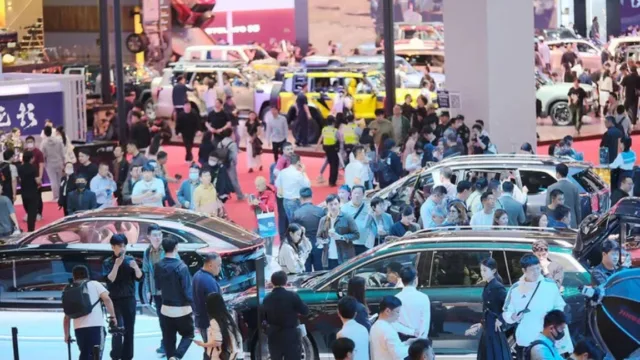
The 21st Shanghai International Automobile Industry Exhibition (Auto Shanghai 2025) has once again proven to be the premier global launchpad for new automotive products, attracting nearly 1,000 well-known domestic and international companies from 26 countries and regions.
Running from April 23 to May 2 with an exhibition area exceeding 360,000 square meters, Auto Shanghai 2025 showcased 1,366 vehicles, with over 70 percent being new energy vehicles (NEVs), and 163 of them making their world debut.
The show drew over 1 million visitors, including 63,000 from over 90 countries and regions outside China, reaffirming its position as a vital platform for previewing future trends in the global automotive market.
In China, for the world
Unofficial statistics revealed that during this year’s Auto Shanghai 2025, renowned foreign brands unveiled over 10 NEV models for global customers for the first time. These include the Mercedes-Benz’s long-wheelbase version of its all-electric CLA saloon, Lexus ES sedan’s hybrid and all-electric versions, and Volkswagen Anhui’s full-size all-electric SUV concept model.
At the Volkswagen Group’s booth, three concept cars made their global debut – the ID. ERA, ID. EVO, and ID. AURA – displayed side by side as a testament to the group’s commitment to its «In China, for China» strategy.
Compared to two years ago, Oliver Blume, CEO of Volkswagen Group, and Ralf Brandstaetter, chairman and CEO of Volkswagen Group China, appeared noticeably more at ease.
At that time, Volkswagen Group was in the midst of an intense transformation period. During Auto Shanghai 2023, the company announced plans to establish a new center in Hefei, focusing on research, innovation, and procurement for NEVs and intelligent connected vehicles.
Two years on, the vision has turned into reality. Volkswagen Group has invested approximately 3.5 billion euros (about 3.95 billion US dollars) in its Hefei R&D center, where cutting-edge electronic architectures and advanced driver assistance systems are now being developed.
«To be very honest, we didn’t have the right product strategy or the right approach to drive the business in China (about two years ago). So, the team, together with our brands, began building an overarching China strategy,» Blume said, adding that the progress over the years has been «quicker than expected.»
«For us, ‘In China, for China’ is not just a slogan, it’s our execution mode,» said Brandstaetter. «We always say it’s a marathon here, not a sprint, and the playoff season starts now…We understand we need to be faster, more efficient, and more cost-competitive, but also more tailored to Chinese consumers’ needs.»
In today’s global economy, where openness is increasingly under strain, concerns have arisen over whether the automotive industry – long celebrated for its vast and interconnected supply chains – might pivot toward a more closed and fragmented model.
Yet, actions speak louder than words. In the first two days alone, nearly 10,000 overseas exhibitors and merchants had already arrived to gauge the market, underscoring the industry’s enduring commitment to global engagement and collaboration.
Agustin Garcia, a Spanish car dealer, flew in specially to attend the event. Despite the challenges posed by an unstable external environment, Garcia remains optimistic about selling Chinese car brands, noting that Spanish consumers «have confidence» in the quality and reliability of Chinese vehicles.
«There’s no question that over the decades, China’s policies of opening up have been one key ingredient in the recipe of success for Chinese economic growth. And I think continuing on that path is what lays the groundwork for further economic growth,» said Ola Kaellenius, chairman of the Board of Management of Mercedes-Benz Group AG.
Kaellenius also noted that China is more than just a huge auto market. «The innovation dynamism, the supplier network that you can find here, I think is on a top level, that is why we are building strong technology partnerships here.»
«Chinese customers embrace new technology, infotainment systems, AI tools, and this is an inspiration by bringing this with our Shanghai R&D team into the whole world,» Kaellenius added.
Future of mobility
The Auto Shanghai 2025 has emerged as an international event that transcends the traditional concept of an auto show.
Xpeng, Geely, Hongqi…many Chinese car brands showcased not only car models, but also robots and futuristic flying cars at their booths.
The automotive industry in the age of artificial intelligence has evolved into an integrated intelligent industry, comprising low-altitude industries, humanoid robots and embodied intelligence, remarked Zhang Yongwei, vice chairman and secretary-general of NEV industry think tank China EV 100.
If the shift from manufacturing cars to producing machines and even humanoid robots signifies an outward expansion, then the focus on self-research and development to enhance core competitiveness represents the industry’s inward quest.
At the auto show, Chinese electric vehicle maker NIO dedicated a special section to display its core technologies, attracting many foreign exhibitors and merchants.
«China has become a global hub for innovation in smart electric vehicles, with companies constantly pushing each other forward,» said William Li, founder and chairman of NIO.
«The driving force behind this is not only our strong market, industrial, and supply chain foundations but, more importantly, the innovative full industry chain that has emerged in China over the past decade. It has enduring vitality,» Li added.
«You have to be here if you want to be an automotive player,» said Stefan Hartung, chairman of the board of management of Robert Bosch GmbH, hailing China’s enormous market scale in the auto industry.
«China has become really from a manufacturing country to an innovation country,» Hartung said, adding that such constant innovation is a «push forward» for the global auto market, which offers «great choices» for consumers.









